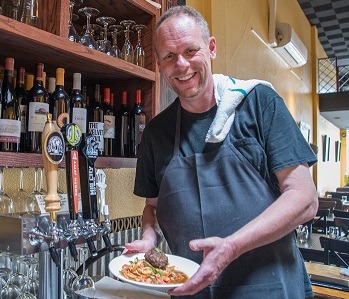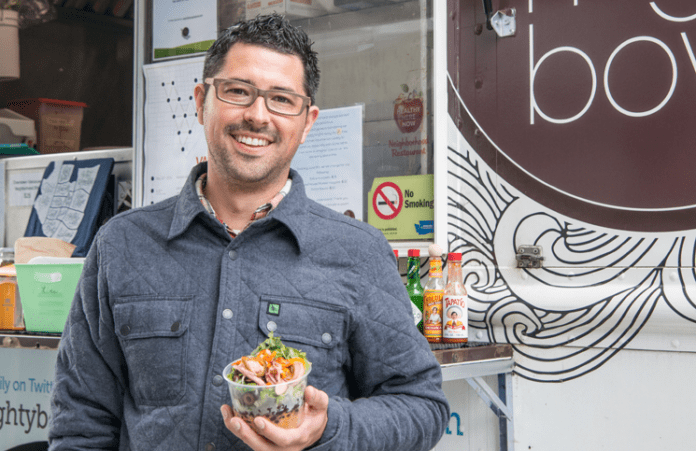Food. There’s nothing more central to human existence. From mere sustenance, to good times with family and friends, to ethnic identity, what we eat and how we eat it is part of who we are as individuals and as communities.
In Vancouver and its surrounding areas, a sense of culinary selfhood is developing. That individuality has been impacted by several outside forces, and yet has a life of its own that will continue to define what “food” means to Southwest Washington.
“The food culture will help shape Vancouver’s cultural identity,” said Steve Valenta, owner of The Mighty Bowl, one of Vancouver’s first food trucks. “For a long time, the only thing we knew is who we weren’t – we were just reacting to Portland. Now we are discovering who we are. It’s fun to be a part of that.”
Slow food movement gains momentum
An increasing consumer desire for locally sourced, sustainably produced food is a major influence on Clark County’s food scene. 12 years ago, when Brad Root opened Roots Restaurant and Bar in Camas, he was considered a pioneer in the ‘farm to table’ movement.
“Each year the demand for fresh, sustainable, local products goes up and up,” said Root. “The local farmers who grow green onions or potatoes – they are supporting the same schools and paying the same taxes as the rest of us and it’s important to keep that money here.”
Paul Klitsie, owner/chef at Willem’s on Main and long-time Vancouver resident, used to have a restaurant in Portland, but he decided to move from the Pearl District to downtown Vancouver in 2013. Like Root, Klitsie is committed to “honest food and small farmers.” He buys lamb from Reister Farms (Washougal) and produce from Quackenbush Farms (Ridgefield) and Dilish Farms (Vancouver).

“There are good farmers around and they are easier to get to than in Portland,” said Klitsie. “There’s a lot of beautiful products around here.”
According to Chris “Salty” Reed, who co-owns Vancouver’s The Grocery Cocktail & Social with his wife Cindy, The Vancouver Farmers Market is a “huge factor” in providing people with a sense of seasonal, local cuisine. Reed said his establishment works with three Ridgefield-based farms (Red Truck Farm, Quackenbush Farm and Little Gnome Farm).
What it comes down to, said Valenta, is that “people are looking for quality, whole-food-based options. People want local chefs doing local food for local people.”
Lift your glasses high
Another significant influence on local fare is the burgeoning beer, wine and spirits industry in the area and statewide.
“People don’t know there are so many craft distilleries in Washington,” said Reed. “90 percent of our liquor selection is from Washington; we only pour Vancouver beers and Washington wines.”
Root expands the definition of “local” to include Oregon and California wines as well, but serves only local tap beers.
“The beer scene is huge,” said Root. “Our customer base is knowledgeable and wants local stuff.”
Klitsie said the growing beer and wine culture brings with it a bigger awareness of what food is. Wineries refer people to places that serve their wines, and if there’s good food to go with good beers, he said, “It means more to you and your body.”
He added that customers – and restaurateurs – are becoming more serious about cocktails.
“There’s thought behind it,” he said. “It’s not just [let’s] open up a bar and sell as much alcohol as we can.”
A little bit of Portland – Washington style
It’s no surprise that Portland, which is “on the edge of innovation in food” according to Valenta, affects what people expect on their plate on this side of the river. However, Valenta said it’s not a copy-cat situation.
For example, he said there are 700 food carts in Portland; The Mighty Bowl was the only one in Vancouver four years ago. Now there are almost a dozen in Clark County. However, they differ from Portland’s version due to restricted hours and higher mobility.
“I love our food carts,” said Reed. “They are so different here than in Portland, and are giving people exciting options, helping with the downtown lunch scene.”
Root said that the customer base in the Vancouver/Camas area is demanding more unique things as they gain new experiences in Portland and become more educated about food.
“I think that is fantastic,” said Root.
The main course is yet to come
Valenta is excited about the changes he’s seeing. First, he said, people outside of Vancouver are discovering that Vancouver is an up-and-coming, emerging market.
“People are investing in Vancouver – that’s a positive sign,” Valenta said. “Food is often the first thing to arrive that creates culture. Community creates culture and culture creates community – it’s synergistic.”
Also, people who once told him that a food cart in Vancouver would never work, who chided him for taking the “road less traveled,” are now beginning to contribute to making Vancouver more interesting and lively.
“There’s a serious need for good food in the area,” said Reed. “Literally, people are hungry for it.”
As the population density of Clark County grows, Valenta sees potential for more multicultural offerings. Reed, who recently started serving a “hangover brunch” on the weekends, said that Vancouver still lacks diversity in food and restaurant options. However, everyone is excited to see what will happen with the various waterfront projects, which Valenta said would “open the door” for more downtown culinary growth.
“There’s a lot of positive energy and focus on smart growth in Clark County,” said Valenta. “People are realizing that Vancouver has a lot to offer.”
That energy, added Klitsie, will turn downtown Vancouver into a destination, which will “make the food scene better.”
A resource sampler
www.slowfoodswwa.com – a chapter of Slow Food USA working to “inspire a transformation in food policy, production practices and market forces so that they ensure equity, sustainability and pleasure in the food we eat”
www.localharvest.org – “real food, real farmers, real community”
www.pickyourown.org/WAsouthwest.htm – listing of U-pick farms in the area
www.vancouverfarmersmarket.com – your local source for fresh produce, with over 200 vendors
www.opentable.com/wa/vancouver-washington-restaurants – review-based roundup of local top restaurants
www.visitvancouverusa.com/things-to-do/dining – the local scoop from the official destination marketing organization for Vancouver.




